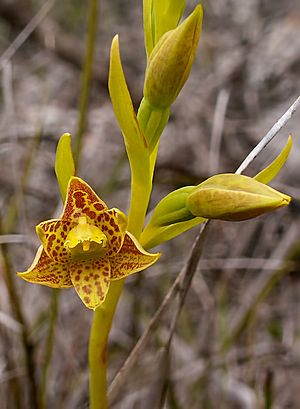Leopard sun orchid facts for kids
The leopard sun orchid (scientific name: Thelymitra benthamiana) is a special type of orchid that grows only in Australia. It gets its name because its flowers often have brownish spots and patterns, a bit like a leopard's fur! This orchid has a single tough leaf and can grow up to ten yellowish-green flowers. Its unique yellow center part, called a column, has fancy fringed edges.
Quick facts for kids Leopard sun orchid |
|
|---|---|
 |
|
| Thelymitra benthamiana near Mount Chudalup | |
| Scientific classification | |
| Genus: |
Thelymitra
|
| Species: |
benthamiana
|
Contents
What Does the Leopard Sun Orchid Look Like?
The leopard sun orchid is a tuberous plant. This means it has a special underground storage part, like a small potato. It is also a perennial herb. This means it lives for more than two years and does not have a woody stem.
It grows a single flat leaf. This leaf is shaped like a spear or an egg. It can be about 5 to 15 centimeters (2 to 6 inches) long. The leaf is also about 2 to 3.5 centimeters (1 to 1.5 inches) wide.
The plant produces between two and ten flowers. These flowers are greenish-yellow with brownish spots and patterns. Each flower is about 3 to 4 centimeters (1 to 1.5 inches) wide. They grow on a flowering stem that is 20 to 40 centimeters (8 to 16 inches) tall.
The flower has parts called sepals and petals. These are usually 1.5 to 2 centimeters (0.6 to 0.8 inches) long. They are about 0.6 to 1 centimeter (0.2 to 0.4 inches) wide. The lowest petal is called the labellum. It is often a bit narrower than the others.
The central part of the flower is called the column. It is yellow or greenish. The column is about 0.6 to 0.8 centimeters (0.2 to 0.3 inches) long. It has wide, fringed edges that look like a fancy border. On top of the anther (which holds pollen), there is a club-like lump.
This orchid usually blooms from September to December. It flowers much more after a bushfire has happened the previous summer.
How Did It Get Its Name?
The leopard sun orchid was first officially described in 1871. This description was made by a scientist named Heinrich Gustav Reichenbach. He published his findings in a book called Beitrage zur Systematischen Pflanzenkunde.
The second part of its scientific name, benthamiana, is special. It was chosen to honor another important botanist, George Bentham.
Where Does It Grow?
The leopard sun orchid is very common and can be found in many places. It grows in areas with low, open shrubs called heath. It also lives in forests.
In Western Australia, you can often find it growing around the edges of large granite rocks. It is found in Western Australia from Geraldton all the way to Israelite Bay. You can also spot it in southern and western Victoria. It grows in south-eastern South Australia and on Flinders Island in Tasmania.
Is It Endangered?
The Western Australian Government's Department of Parks and Wildlife has looked at the leopard sun orchid. They have classified it as "not threatened." This means it is not currently at risk of disappearing.

